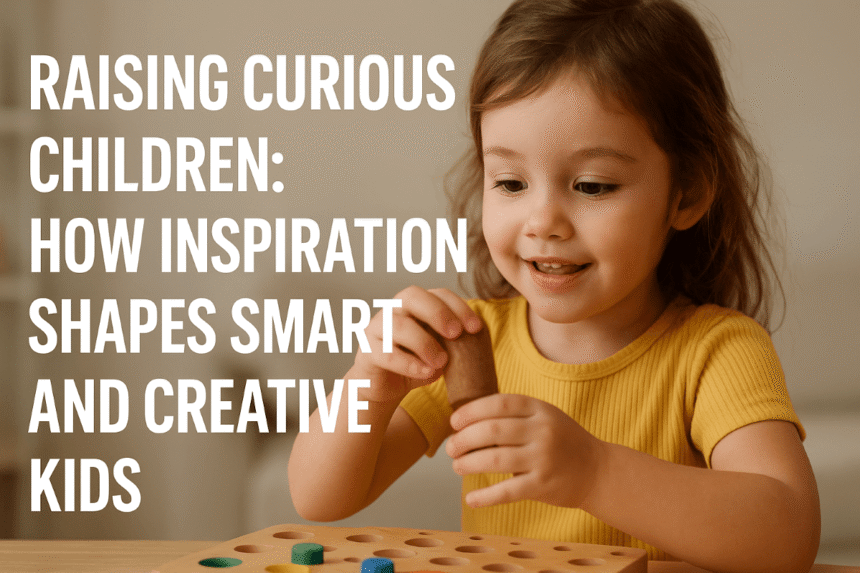Raising curious children is one of the most important ways to help them develop intelligence, creativity, and lifelong learning skills. Many parents assume that pressure, strict schedules, and constant performance checks are the keys to success, but research and experience show otherwise. Smart kids aren’t made by pressure; they’re shaped by encouragement, inspiration, and the freedom to explore.
In this article, we’ll explore why curiosity matters, the benefits it brings, practical tips for nurturing it, and 10 engaging activities that help children grow into confident, creative, and resilient learners.
Why Raising Curious Children Matters?
Raising curious children is one of the most important gifts a parent can give. Many parents mistakenly believe intelligence comes from pressure — long study hours, strict schedules, and constant performance checks. But real intelligence grows when children are inspired, not forced. Smart kids aren’t made by pressure; they’re shaped by encouragement, exploration, and the freedom to ask questions.
When curiosity is nurtured, children become problem-solvers, dreamers, and creators. They develop the confidence to experiment, the resilience to handle setbacks, and the imagination to explore new possibilities. Encouraging curiosity sets the foundation for lifelong learning, emotional intelligence, and holistic development.
Raising curious children inspires creativity, problem-solving, and lifelong learning with simple tips and fun activities.
Curiosity Is the Seed of Intelligence
Every child is naturally curious. From a young age, children ask “why,” “how,” and “what if” about the world around them. Each question is an opportunity for growth — a small seed of intelligence waiting to bloom. Raising curious children means treating these questions with attention, patience, and excitement, rather than dismissing them as annoying interruptions.
For example, if a child asks why the sky is blue, instead of saying, “Just because,” a parent can explore together: “That’s an interesting question! Let’s find out why using a simple experiment with water and light.” By guiding children toward discovery, you turn learning into a joyful experience rather than a chore.
Parent Tip: Create a “question of the day” habit. Encourage your child to ask one question daily, and explore the answer together. This builds critical thinking and shows that curiosity is valued.
Pressure Hinders Growth — Inspiration Fuels It
Many parents rely on pressure to motivate children — pushing them to achieve high grades, excel in extracurriculars, and meet rigid expectations. While this approach may show short-term results, it often breeds stress, fear, and self-doubt. Children under pressure may become perfectionists, avoiding challenges for fear of failure.
Raising curious children in an inspiring environment fosters intrinsic motivation. Children learn because they want to, not because they feel obligated. For instance, instead of forcing a child to memorise multiplication tables, encourage them to explore patterns in numbers through games or puzzles. When learning is associated with fun and exploration, children develop confidence and resilience.
Parent Tip: Praise effort, creativity, and persistence instead of only outcomes. Statements like, “I love how you figured that out!” encourage problem-solving, while “You must get this right” can create anxiety.
Emotional Intelligence Develops Through Curiosity
Curiosity isn’t only cognitive — it’s emotional. Children who are encouraged to explore their surroundings, ask questions, and try new things also develop empathy, self-awareness, and patience. These are essential aspects of emotional intelligence.
For example, a child asking why a friend is upset opens the door to discussions about emotions, understanding, and perspective-taking. By guiding them to explore feelings without judgment, parents help children develop healthy emotional responses.
Raising curious children fosters a mindset where emotional exploration is safe. When children understand their own emotions and those of others, they can navigate social challenges, communicate effectively, and build lasting relationships.
Parent Tip: Encourage discussions about feelings alongside factual questions. Ask, “How do you think your friend felt?” to help children link curiosity with empathy.
Benefits of Raising Curious Children
Raising curious children has a wide array of benefits that extend beyond academics:
- Enhanced Problem-Solving Skills: Curious children learn to approach challenges from multiple angles, allowing them to think critically and creatively. For example, when a child struggles to build a LEGO structure, curiosity encourages them to try different combinations rather than giving up. Over time, this improves their analytical thinking and persistence.
- Stronger Creativity: Children who explore ideas freely are more likely to invent, imagine, and innovate. Encouraging them to draw, write, or experiment without strict rules nurtures creativity. For instance, a child asked to design a “new toy” can brainstorm unique ideas instead of replicating existing ones.
- Lifelong Learning Habits: Children driven by curiosity develop a natural love for learning. They read beyond school books, watch educational videos, and ask thoughtful questions, cultivating habits that last into adulthood.
- Better Academic Performance: While pressure-based learning may boost grades temporarily, curiosity-driven learning improves understanding and retention. Children remember concepts better when they actively explore and question them.
- Emotional Resilience: Curious children are more willing to face challenges and handle failures gracefully. They view mistakes as opportunities to learn rather than as threats.
- Improved Communication Skills: Asking questions, discussing ideas, and exploring answers improve articulation and social interaction. A child who can express curiosity effectively also learns to listen and engage with others meaningfully.
Parent Tip: Encourage curiosity in all areas — science, arts, culture, and daily life. Even routine activities, like cooking or grocery shopping, can spark questions and discussions that strengthen cognitive and emotional growth.

Practical Tips for Raising Curious Children
Here are detailed strategies to help parents nurture curiosity:
- Make Learning Fun and Hands-On: Children learn best when actively engaged. Experiments, arts, and real-world activities make abstract concepts tangible. Instead of teaching fractions through worksheets alone, use pizza slices or fruit to demonstrate parts and wholes. Hands-on activities make learning memorable and exciting.
- Model Curiosity Yourself: Children emulate adults. Demonstrating curiosity in your own life teaches children to do the same. Ask questions aloud, explore new topics, and show excitement when discovering something new. Reading an article together and discussing interesting points encourages a shared love of learning.
- Avoid Over-Scheduling: While structured routines are important, excessive scheduling leaves little room for independent exploration. Free play and downtime allow children to pursue their interests spontaneously. Encourage activities like drawing, outdoor play, or building projects, where children can experiment and problem-solve at their own pace.
- Encourage Questions, Not Just Answers: Instead of providing immediate answers, guide children to discover solutions themselves. If a child asks how plants grow, respond, “That’s a great question! How about we plant seeds and observe what happens?” This approach nurtures curiosity, critical thinking, and experimentation.
- Provide Resources for Exploration: Books, educational games, museums, nature walks, and digital learning tools spark curiosity. Even everyday experiences, like grocery shopping, can become learning opportunities by asking questions like, “Why do we have different types of apples?” or “How is bread made?”
- Celebrate Effort and Discovery: Recognise curiosity, effort, and exploration, not just results. If a child tries a new experiment, praise their effort with, “I love how you tried different ideas until it worked,” rather than focusing solely on success. Celebrating discovery fosters a growth mindset and encourages continued exploration.
10 Practical Activities to Boost Curiosity
Spark your child’s curiosity! Learn how raising curious children builds creativity, confidence, and problem-solving skills. Raising curious children nurtures smart, creative kids. Discover practical tips and 10 activities to inspire lifelong learning.
Here’s a table of 10 practical curiosity-boosting activities to make raising curious children actionable and fun:
| Activity | How It Boosts Curiosity | Example | Parent Tip |
|---|---|---|---|
| Nature Exploration | Encourages observation and questioning | Go on a nature walk and ask children to notice insects, plants, or birds | Ask, “Why do you think this plant grows here?” to spark thinking |
| Hands-On Science Experiments | Develops problem-solving and experimentation skills | Grow a plant from a seed, or mix baking soda and vinegar | Let children make predictions before testing |
| Creative Arts & Crafts | Encourages imagination and creativity | Build a model city using cardboard and clay | Avoid rigid instructions; let them invent freely |
| Cooking Together | Teaches sequencing, measurements, and curiosity about processes | Play a puzzle game or a strategy board game | Encourage them to ask, “What happens if we change the ingredients?” |
| Storytelling & Role Play | Boosts imagination, communication, and empathy | Create a story about a superhero solving a problem | Ask, “What would you do if you were the character?” |
| Educational Games & Puzzles | Enhances critical thinking and logic | Play a puzzle game or strategy board game | Praise creative solutions rather than just winning |
| Museum or Science Center Visits | Exposes children to new knowledge and experiences | Explore interactive science exhibits | Encourage questions like, “How do you think this works?” |
| Observation Journals | Develops attention to detail and curiosity | Keep a daily nature or weather journal | Discuss observations together and encourage questions |
| DIY Projects & Building Kits | Fosters problem-solving and hands-on learning | Build a robot or a simple circuit kit | Let children figure out steps themselves, with guidance if needed |
| Open-Ended Questions During Daily Life | Encourages thinking and exploration | Ask, “Why do you think bread rises?” while cooking | Avoid giving immediate answers; explore together |
Common Mistakes Parents Make
Even well-meaning parents sometimes hinder curiosity unintentionally:
- Focusing Only on Grades: Children need more than academic performance. Curiosity, creativity, and problem-solving are equally important. Encourage learning for understanding, not memorisation.
- Discouraging Questions: Phrases like “Stop asking so many questions” or “You already know that” suppress curiosity. Responding with interest keeps the child engaged and confident.
- Imposing Rigid Routines: Overly structured schedules limit time for exploration. Allow children flexibility to pursue personal interests.
- Punishing Failure: Children must see mistakes as learning opportunities. Overreacting to errors discourages experimentation and risk-taking.
Parent Tip: Create a safe environment for questions and mistakes. Model curiosity, and show that exploring, failing, and learning are natural parts of growth.
Avoid These Common Parenting Mistakes For Better Parenting
Conclusion
Smart kids aren’t born under pressure; they thrive when inspired. Raising curious children develops creativity, problem-solving skills, emotional intelligence, and a love for lifelong learning. Every question your child asks is a seed of potential — when nurtured with patience, guidance, and encouragement, it grows into a confident, imaginative, and capable individual.
By inspiring curiosity rather than enforcing pressure, parents raise not just smart kids, but dreamers, innovators, and resilient human beings.
✨ Every question is a seed. Nurture it with patience, love, and the magic of curiosity.
Are you inspiring your child’s curiosity or just pushing for grades?
Raising Respectful Sons | How to Raise Sons Who Respect Women (and Everyone Else)
5 FAQs – Raising Curious Children
1. What does it mean to raise curious children?
Raising curious children means encouraging them to ask questions, explore, and discover the world around them. It focuses on inspiration and guidance rather than pressure.
2. Why is curiosity important for kids?
Curiosity develops critical thinking, problem-solving, creativity, and emotional intelligence. Children who explore and ask questions are more confident and adaptable in life.
3. How can parents nurture curiosity at home?
Parents can nurture curiosity by encouraging questions, offering hands-on activities, exploring nature, playing educational games, and modelling curiosity themselves.
4. What are the benefits of raising curious children?
Curious children become creative, resilient, and lifelong learners. They develop problem-solving skills, emotional intelligence, better academic understanding, and a love for exploration.
5. Can curiosity be encouraged without pressuring kids?
Yes! Children learn best when inspired, not forced. By celebrating effort, offering choices, and creating a safe environment for exploration, parents can cultivate curiosity naturally.
Thank you for taking the time to explore this post. I hope you found it both insightful and enjoyable.
Remember, your sharing can make a positive impact! Please share this post across your social media and other networks, allowing others to benefit from its content.
PVM

Mathukutty P. V. is the founder of Simply Life Tips, a blogger, content writer, influencer, and YouTuber passionate about learning and sharing. Guided by “Simple Living, Creative Thinking,” he believes in the power of knowledge sharing and lifelong learning.
Related
Discover more from Simply Life Tips
Subscribe to get the latest posts sent to your email.







